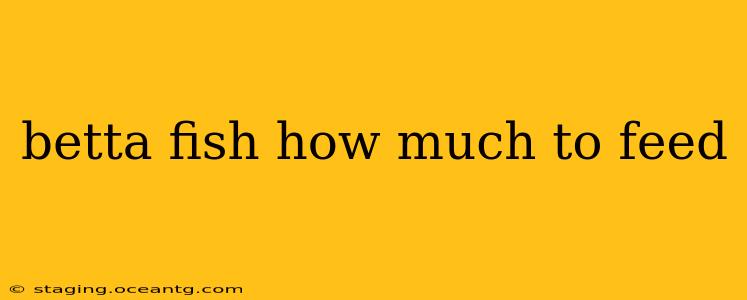Betta fish, with their vibrant colors and flowing fins, are captivating aquatic companions. However, responsible betta ownership involves understanding their dietary needs. Overfeeding is a common mistake that can lead to serious health problems, while underfeeding can result in stunted growth and weakened immunity. So, how much should you feed your betta? Let's dive in!
How Much Should I Feed My Betta Fish?
The general rule of thumb is to feed your betta fish **only as much as they can consume in 2-3 minutes. This translates to a small pinch of food, typically 2-4 pellets or a similarly sized amount of live or frozen food. Avoid overfilling their bowl or tank; uneaten food will quickly pollute the water. Remember, a slightly hungry betta is a healthy betta!
How Often Should I Feed My Betta Fish?
Most adult bettas should be fed once or twice a day. However, this can vary depending on the age and activity level of your fish. Younger, growing bettas might require slightly more frequent feeding. Always observe your fish's behavior; if they seem less interested in food, adjust the feeding schedule accordingly. A good schedule might involve a small feeding in the morning and a slightly larger feeding in the evening.
What Happens If I Overfeed My Betta Fish?
Overfeeding is a significant threat to your betta's health. Excess food will decompose in the water, leading to:
- Water quality issues: Increased ammonia and nitrite levels, which are highly toxic to bettas.
- Constipation: Bettas can become constipated from eating too much, which can lead to serious complications.
- Obesity: Like humans, bettas can become obese, affecting their overall health and lifespan.
- Bloated abdomen: A clear sign of overfeeding; if you notice your betta's abdomen is swollen, reduce the food amount immediately.
What Kind of Food Should I Feed My Betta?
Betta fish require a balanced diet that includes:
- High-quality betta pellets: These provide essential nutrients and are readily available. Look for pellets specifically formulated for bettas, and avoid those that contain fillers.
- Bloodworms (live, frozen, or freeze-dried): A nutritious and highly palatable treat, but should be offered sparingly due to their high fat content.
- Daphnia and brine shrimp (live, frozen, or freeze-dried): These small crustaceans offer a good source of protein.
- Mosquito larvae: A natural and healthy food source.
Always avoid feeding your betta human food; it lacks the necessary nutrients and can be detrimental to their health.
What if My Betta Doesn't Eat All Its Food?
If your betta doesn't finish its food within a couple of minutes, immediately remove the uneaten food using a small net or siphon. This prevents water contamination and maintains a clean and healthy environment for your fish.
How Do I Know if My Betta is Getting Enough Food?
A healthy betta will be active, have bright colors, and maintain a healthy weight. If you notice any lethargy, weight loss, or fading colors, adjust the feeding schedule or consult a veterinarian specializing in aquatic animals.
Can I Fast My Betta Fish?
Occasional fasting (a day or two every few weeks) can be beneficial for your betta's digestive system. However, this should not be a regular practice, especially for younger bettas.
Remember, responsible feeding practices are crucial for the well-being of your betta fish. By adhering to these guidelines, you can ensure your finned friend thrives and enjoys a long, healthy life.
